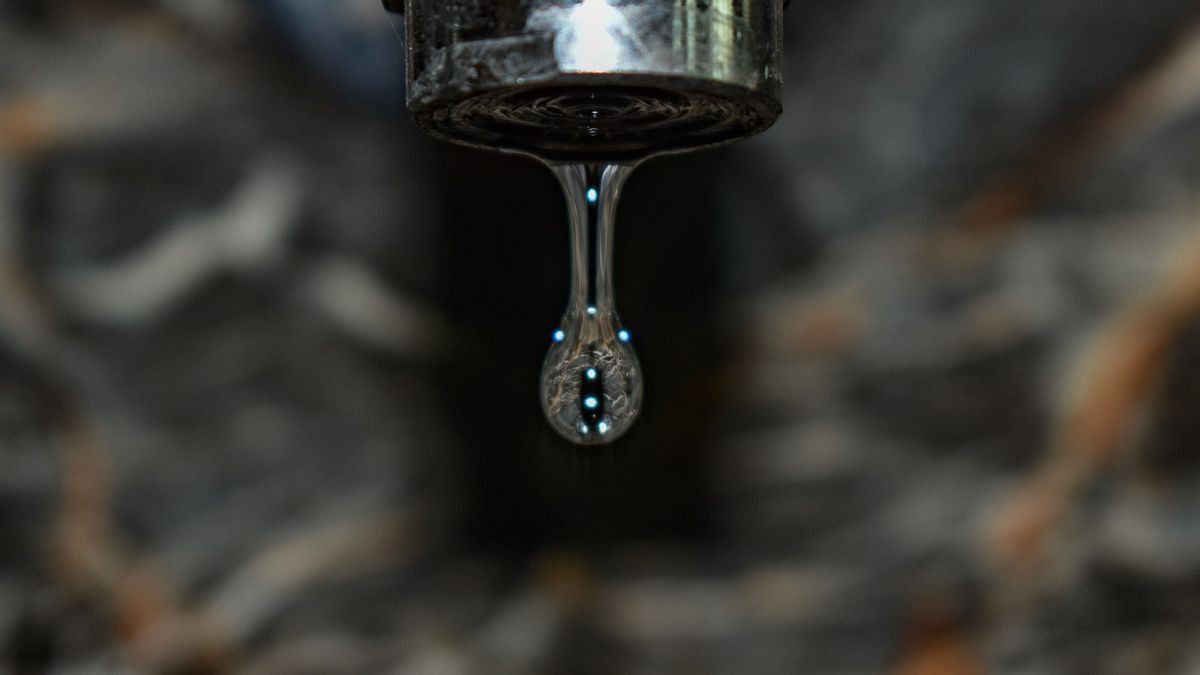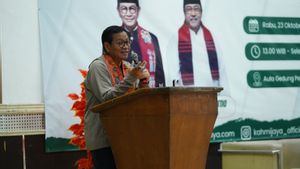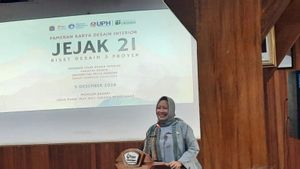JAKARTA - The government will stop the use of ground water in the DKI Jakarta area and its surroundings. This is done as an effort to maintain the quality of Jakarta's land, including preventing the capital city from sinking. The problem is a dilemma. If we use ground water, Jakarta will sink. If not sucking water from the ground, where do we get clean water from?
"So, we have to stop the use of groundwater in DKI Jakarta and its surroundings. Of course, to ensure that land subsidence in Jakarta does not happen again," said Director General of Human Settlements at the PUPR Ministry Diana Kusumastuti, quoted by Antara, Monday, October 4.
The Provincial Government (Pemprov) of DKI Jakarta said that the ban on the use of ground water was inappropriate. The reason is, "The coverage of our piped water supply is only 64 percent, it's not appropriate if we ban ground water," said Head of the Water Resources Service (SDA) Yusmada in a working meeting with Commission D of the DKI Jakarta DPRD, Tuesday, October 5.
Yusmada also explained that to this day the residents of Jakarta are still very dependent on groundwater as a source of raw water, apart from Waduh Jatiluhur in Purwakarta, West Java. The DKI Provincial Government, said Yusmada, has another mechanism to limit groundwater extraction, namely the land tax.
The mechanism is regulated in Regional Regulation (Perda) Number 10 of 1998 concerning the Implementation and Taxation of Groundwater and Surface Water Utilization. "It is within our framework to control groundwater, especially commercial deep groundwater," said Yusmada.
In addition to taxes, the DKI Provincial Government is also drafting regulations to regulate groundwater free zones. The zoning will be determined in locations that have been reached by the piped water network. "The areas that have been served by pipelines are obligatory for us to ban groundwater. The groundwater-free zone is being prepared by the governor's regulation," Yusmada said.
The old dilemma of water and land in the capital city
In October 2019, the journal Nature Communications released research results that predicted Jakarta would sink in 2050. Indonesian Institute of Sciences (LIPI) researcher Intan Suci Nurhati explained a number of things that could have caused Jakarta to sink. One of them is community behavior, such as extracting groundwater using drilled wells.
"For Jakarta itself, it's like (the impact) because of climate change to North Jakarta, but because there is groundwater extraction (the impact) to Monas. For example, like that, this is just a comparison," explained Intan, quoted by Kompas.com.
Intan, who is also a member of the UN Intergovernmental Panel on Climate Change, explained that in Jakarta, land subsidence due to community behavior plays a more important role than climate change itself. Therefore, in addition to exploring the impact of climate change, the authorities must also look for patent solutions to stop the extraction of groundwater.
Those two things, said Intan, will greatly influence what solution should be taken. "If we talk about a city like Jakarta, if we want to save this city from sea level rise and we are not careful to see which factor is more dominant, we are afraid that our focus is not right."
"For example, if Jakarta suppresses the use of ground water, the effect will be very helpful (reducing the impact of a larger sea level rise). Now that's one way we can do it locally," said Intan.
In July 2020, the DKI Jakarta Provincial Government released data on PAM Jakarta's clean water customers. According to this data, the cubication of water from PAM has grown by two percent every year since 2013. Clean water in Jakarta is supplied by PT PAM Jaya, which partners with PT Palyja - which handles water supply for the western region - and PT Aetra for the eastern region.
Quoted from the Jakarta.go.id website, in 2019, the number of clean water customers recorded was 878,268 customers, with the total production and cubication of water sold amounting to 631.96 million m3 and 362.63 million m3, respectively. This means that each PAM customer spends an average of 719.6 m3 during 2019.

This two percent growth has an impact on the increase in the value of the rupiah obtained by PAM every year, except for 2014 and 2019. As of 2018, the value of the rupiah obtained by PAM is Rp.2.74 trillion. Meanwhile, in 2019, PAM received Rp2.43 trillion, down about 11 percent. This decline is the largest during the period.
Based on data from PAM Jaya DKI Jakarta, the non-commercial group is the largest customer with a total of 743,555 customers or about 85 percent of the total clean water customers in DKI Jakarta. The next largest number of clean water customers is the commercial group with a total of 123,432 customers.
In the non-commercial group, households are the largest number of clean water customers, namely 739,944 or 99.5 percent of the total non-commercial customers. The largest volume of water distributed by PAM occurred in 2019, namely to residential customers. This is in accordance with the number of clean water customers in the household group which is also the largest in DKI Jakarta.
The volume of water distributed by PAM to residential houses is up to 16 million m3 or about 53 percent of the total volume of water distributed in DKI Jakarta. This makes the value of rupiah obtained by PAM from the group of residential houses is also the highest, which is Rp. 0.95 trillion or 39 percent.
Even though the number of government agency customers is 66 percent more than the number of hotel/tourist attraction customers. However, the volume of water distributed to hotel/tourism customer groups is more, which is three million m3. So that the value of the rupiah obtained is also much higher, namely as much as Rp. 411.022 billion.
In an article published in Kompas in 2019, President Director of PAM Jaya Bambang Hermowo mentioned 2030 as the target where all Jakarta residents will have access to clean piped water. PAM is collaborating with the DKI Jakarta SDA Office to build a water supply system at various points.
Central government stepsThe central government is not ignorant of this problem. Director General of Human Settlements at the PUPR Ministry Diana Kusumastuti explained that the central government is building two regional drinking water supply system (SPAM) projects, namely Jatiluhur 1 and Karian Serpong.
The two projects are targeted for completion in 2024. These projects are important so that the use of groundwater by the people of DKI Jakarta and its surroundings can be stopped. Diana explained that the construction of the two SPAMs uses a government-business partnership (PPP) scheme.
The SPAM will meet the water needs of residents of DKI Jakarta and its surroundings, including Bekasi and Karawang. The water source will be taken from the Jatiluhur Dam for the Jatiluhur regional SPAM 1. Then, the water source for the Karian Serpong SPAM will come from the Karian Dam.
"This is because the DKI Jakarta area does not have a raw water source," said Diana.
Previously, PUPR Minister Basuki Hadimuljono said the Karian Serpong SPAM PPP project would prevent land subsidence in the Jakarta area. If the water needs of the western area of Jakarta have been met, then the government can prohibit the use of ground water in the Jakarta area and its surroundings.
*Read other information about WATER or read other interesting articles from Diah Ayu Wardani and Yudhistira Mahabharata.
Other BERNAS
The English, Chinese, Japanese, Arabic, and French versions are automatically generated by the AI. So there may still be inaccuracies in translating, please always see Indonesian as our main language. (system supported by DigitalSiber.id)









